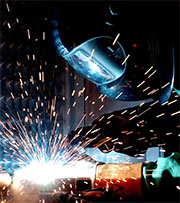
Advanced Welder Education
atecentral.net/msites/pcoomar/home
Monroe County is part of "Automation Alley," a nickname that recognizes the area's automotive intensive industries. The demand for skilled trades personnel in these industries has increased, with 5000 new postings for South East Michigan region alone. Total employment for these industries is about 113,000 workers (Workforce Intelligence Networks, 2017). Half of these workers are welders, fabricators, and tool and die makers. This Monroe County Community College welding technology project is designed to increase the number of qualified welders who can lead research, development, and innovation in the advanced manufacturing field. The project develops new curriculum materials and implements them in courses conforming to Advanced Level Welder QC 11 training standards. These standards were revised in August 2017 and further defined by the Schools Excelling Through National Skills Standards Education Program led by the American Welding Society. By incorporating the latest additions to the Advanced Level QC 11 standards, the college aims to produce highly skilled welders who can support research and development. This training also enables students to pursue associate of applied science and/or baccalaureate degrees. The project includes existing articulation pathways between the college and area universities, and will develop new articulation/transfer pathways to other four-year schools. The project also adds to the pool of qualified Inspectors in Non-Destructive Testing, a field in which the college offers the state's only certificate program. By completing these activities, this project has the potential to help students advance educationally and occupationally, thus making a significant impact on the economy of the Southeast Michigan region.







